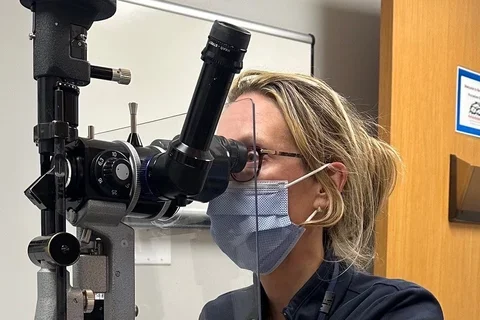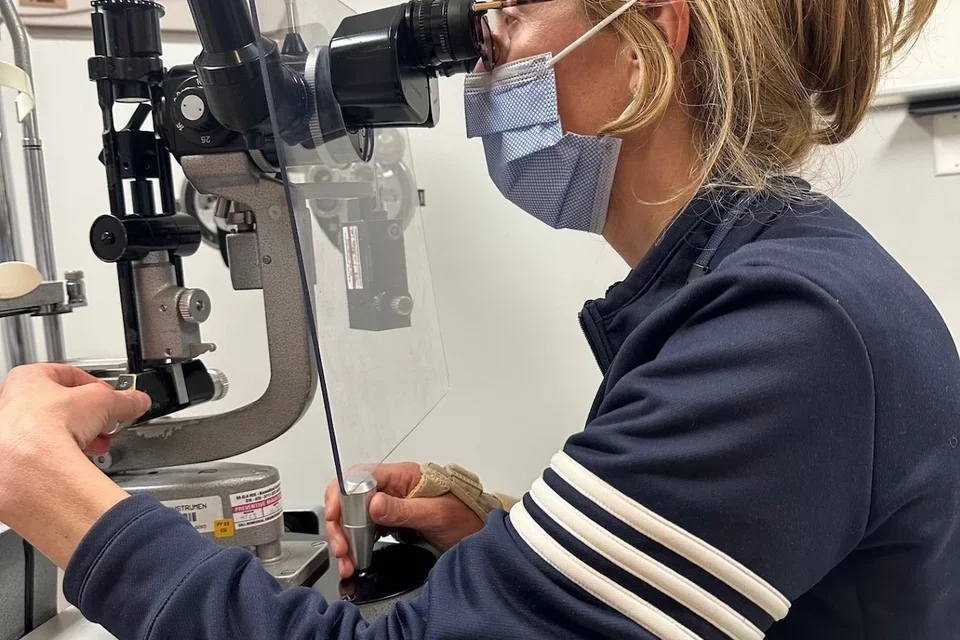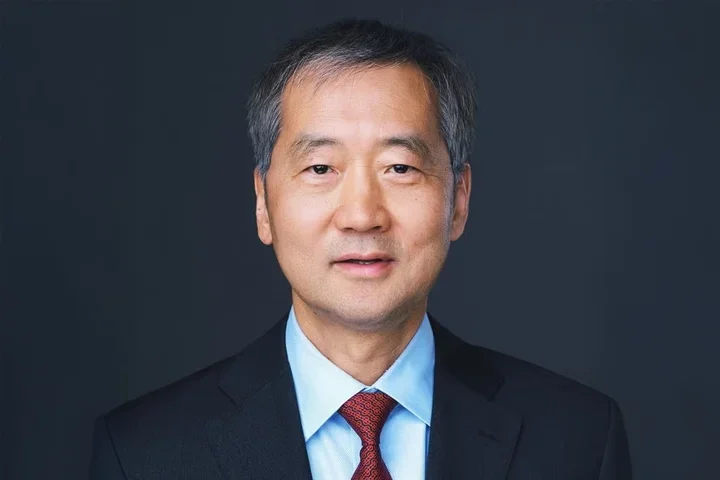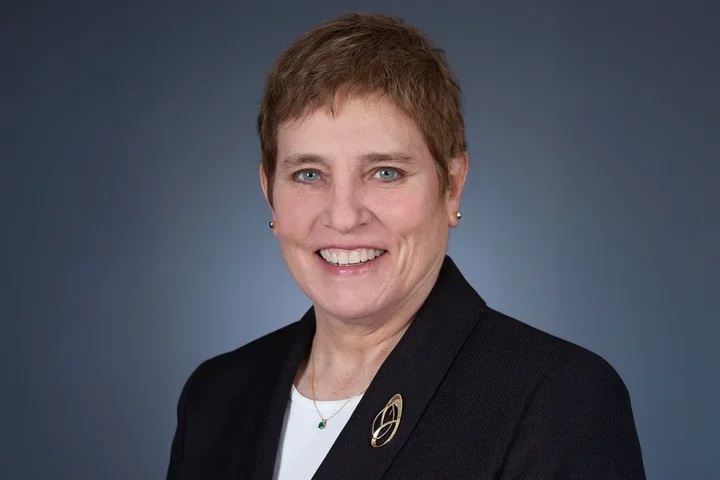What Is an Ophthalmologist?
Faculty Spotlight

A Day in the Life of Dr. Joann Giaconi, Ophthalmologist at UCLA Health
On any given day, the average person blinks thousands of times—about twenty times in a single minute. The orbicularis oculi, the fastest moving muscle in the human body, makes this movement seem automatic.
People can read words and see beautiful complex images because specialized photoreceptor cells in their eyes transform incoming light into electrical signals the brain can process.
Vision may seem effortless, but it relies on the complex interplay of multiple muscles, nerves, tissues, and blood vessels that make up the human eye—widely considered the second most complex organ after the brain.
Ophthalmologists ensure all the eye’s complex parts function properly. These physicians study how the eyes and vision work and know what to do in cases when they’re not working as expected—when an injury or a condition, such as cataracts, impacts their functionality.
Restoring healthy vision to patients affected by cataracts is what Jo Ann A. Giaconi, MD enjoys most about being an ophthalmologist.
“During cataract surgery, one truly improves life for patients. It's gratifying when a patient talks about how they thought they’d never be able to see so well again.”
She finds the surgery both procedurally stimulating and personally meaningful. Going through it with a patient can deepen an already close relationship.
What Does an Ophthalmologist Do?
Ophthalmologists diagnose and treat conditions affecting a patient’s eyes and/or vision.
These specially trained physicians offer comprehensive services ranging from routine eye exams in the clinic to corrective laser procedures to interventions for the most complicated and rare eye diseases.
What an ophthalmologist does on a given day depends on whether they practice comprehensive ophthalmology or focus on a specific sub-specialty.
Dr. Giaconi’s clinical work focuses on glaucoma and cataract care. The primary surgeries she performs are related to glaucoma and cataract removal. However, a day in her life involves many academic and administrative responsibilities as well. She’s an ophthalmology professor, co-director of medical student education in ophthalmology, and chief of ophthalmology for the Greater Los Angeles Veterans Administration. When she’s not in the clinic or operating room, she might be doing research or supervising and teaching medical students, residents, and fellows from the David Geffen School of Medicine at UCLA (DGSOM), the Stein Eye Institute, and the Charles Drew School of Medicine.
She finds teaching fulfilling, especially coming up with creative ways to help people learn. Her commitment to education and advocacy has earned her multiple awards from the American Academy of Ophthalmology.
Optometrist vs Ophthalmologist - What’s the Difference?
Optometrists and ophthalmologists both broadly focus on helping people maintain healthy eyes and vision.
“They're both the colloquial ‘eye doctor,’” Dr. Giaconi explains.
Despite this overarching commonality, the two practitioners differ in several important ways that many people, even professionals within the medical field, commonly misunderstand.
Optometrists and ophthalmologists have different education and training paths.
After earning their undergraduate degrees, ophthalmologists complete medical school, residency training, and—if they wish to practice an ophthalmology sub-specialty—additional fellowship training.
“During residency, ophthalmologists in training build on the knowledge and procedural skills they learned in medical school so they can safely and effectively perform surgery and diagnose all vision problems,” says Dr. Giaconi.
After earning their undergraduate degrees, aspiring optometrists complete optometry school and then go into the workforce. A minority may complete an optometry residency, which typically lasts around a year, but they are not required to do so before practicing.
Optometrists and ophthalmologists focus on different things in their practice.
Optometrists generally focus on routine eye examinations and consultations for vision correcting lenses (contact lenses and eyeglasses). They may use state-of-the-art equipment to detect potentially problematic eye abnormalities and conditions. If they detect or suspect a complex condition, they’ll likely refer the impacted patient to an ophthalmologist.
Ophthalmologists complete medical school and get more intensive pathology training during residency than optometrists do.
While they too perform routine eye examinations, their practice also covers the diagnosis and treatment of a comprehensive range of diseases.

Ophthalmologist Sub-Specialties
After completing their foundation education and training, ophthalmologists may further specialize by seeking additional fellowship training or by narrowing their practice to a specialized area.
Sub-specialized ophthalmology practice areas include:
- Cataract and refractive surgery
- Corneal and anterior segment
- Glaucoma
- Neurological disease
- Oculoplastics (medical and cosmetic surgeries)
- Pediatrics
- Retina and vitreous conditions
- Uveitis (Ocular immunology)
What Is a Pediatric Ophthalmologist?
A pediatric ophthalmologist is a medical doctor who has further subspecialized to diagnose and treat eye conditions affecting infants, children, and adolescents.
What Is a Neuro Ophthalmologist?
A neuro ophthalmologist is a medical doctor who has further subspecialized to diagnose and treat eye conditions and vision problems linked to the nervous system.
What Kind of Patients See an Ophthalmologist
Ophthalmologists see patients for both preventative care and concerns related to the eyes or vision, including:
- Routine eye examinations
- Ongoing care for diagnosed conditions
- Surgical interventions, such as corneal transplant or retinal detachment repair
- Surgical procedures for vision correction, such as laser-assisted in situ keratomileusis (LASIK)
- Evaluations of vision changes or other emerging symptoms
- Vision correction consultations and examinations
- Restorative and general care following an eye- and/or vision-affecting injury
Some signs and symptoms that may lead patients to seek an ophthalmologist’s care include:
- Blurred vision
- Double vision
- Light sensitivity
- Spots on the eye
- Vision loss
- Tunnel vision
- Drooping eyelid
Visit UCLA Health’s Eye Signs and Symptoms page for more information on symptoms and potential treatments.
What Conditions Does an Ophthalmologist Treat?
Hundreds of different conditions can affect the vision and the eyes. Ophthalmologists have the skills and training necessary to treat them all.
Some common eye and vision conditions include:
- Age-related macular degeneration
- Amblyopia (lazy eye)
- Astigmatism
- Cataracts
- Color blindness
- Diabetic retinopathy
- Glaucoma
- Conjunctivitis (pink eye)
- Retinal detachment
- Refractive errors
- Strabismus (crossed eyes)
- Eye infections
- Retinal tear/detachment
Visit UCLA Health’s Eye Conditions page for more information on symptoms and potential treatments.
How to Become an Ophthalmologist
Aspiring ophthalmologists should expect to complete medical school and residency training in ophthalmology. They may also complete additional fellowship training if they wish to practice a sub-specialty.
Dr. Giaconi says she always knew she wanted to follow in her father’s footsteps and become a doctor. She didn’t realize she wanted to practice ophthalmology until medical school.
She found herself gravitating toward surgical specialties, but she also deeply enjoyed everyday patient encounters. Ophthalmology seemed like the ideal combination of surgery, clinical patient care, and many other interests she’d discovered during med school.
“You’re not eliminating possibilities for your future career when you specialize in ophthalmology,” she says.
“If you want to treat kids, you can do that, or you can concentrate on adults. If you love surgery, there are many different surgeries we do, but if you find later in life that performing surgery isn’t satisfying or physically possible anymore, you can practice medical ophthalmology. An ophthalmologist can have a comprehensive practice and see the entire breadth of eye problems each day or they can super subspecialize in a particular set of eye problems. There are abundant research and industry opportunities as well. Ophthalmology is a wonderful field."
In addition to offering variety, ophthalmology incorporated surgical procedures Dr. Giaconi found fascinating. She’ll never forget observing cataract surgery for the first time.
“I thought it was amazing that these tiny super-thin structures, thinner than a human hair, could be cut away by a human hand, and that you could break up the lens and vacuum it out,” she recalls.
Dr. Giaconi advises med students interested in ophthalmology to deeply reflect on the reasons they’re drawn to it.
She knows, for example, that many medical students consider ophthalmology because they love cataract surgery, a one-time procedure that can effectively correct a patient’s condition.
“Ophthalmology is not only cataract surgery. We also handle many other conditions that don’t have a quick fix.”
Vision loss, due to non-cataract problems, can be irreversible. Ophthalmologists may have to accept that slowing down its progression could be the best-possible outcome for the patient.
“Sometimes, you’ll just have to hold a patient’s hand through vision loss.”
Dr. Giaconi also warns against pursuing ophthalmology based on rumors that it comes with an easier lifestyle relative to other medical specialties.
“The residency training is demanding,” she says. “You're up all night seeing patients because they do come in the middle of the night with vision loss and you have to manage difficult clinical problems. That is sometimes surprising to some medical students—that there are true emergencies in ophthalmology.”
There’s no “emergency ophthalmology” subspecialty because ophthalmologists simply handle emergencies as part of their general practice.
“People don’t always realize that ophthalmologists have to be available to patients 24/7,” Dr. Giaconi explains. “Eye emergencies don't happen exclusively during regular business hours.”
In addition to pursuing ophthalmology because they genuinely love the subject matter and clinical aspect, Dr. Giaconi says a strong future ophthalmologist will be detail oriented, adaptable, and compassionate.
In ophthalmology, positive outcomes often depend on microns (micrometers).
“One has to be compulsive about detail in preparing for surgeries and in monitoring disease.”
Adaptability is crucial for handling unexpected complications and also for learning about the constant stream of new tools and technologies introduced into the field.
Compassion can make all the difference to ophthalmology patients.
Sight is a sense many of us take for granted. When a person finds themselves at risk of vision loss or impairment, it's common to experience intense fear and anxiety. By listening closely and addressing their concerns, an effective ophthalmologist can support and comfort patients facing unfavorable diagnoses or intensive treatment procedures.
How Long Does It Take to Become an Ophthalmologist?
After completing medical school, which typically takes 4 years, aspiring ophthalmologists will spend at least another 4 years completing residency training before they begin practicing. Individuals intending to subspecialize within ophthalmology should factor in 1 to 3 additional years of fellowship training.

Ophthalmologist Salary - How Much Do Ophthalmologists Make?
According to recent Medscape compensation data, ophthalmologists practicing in the United States make an average of $388,000 annually.
Healthy Vision Month
Health Vision Month takes place every May. The observance highlights the importance of taking proactive steps to monitor and maintain healthy vision. This includes getting annual eye exams, being aware of common eye conditions and symptoms, and understanding more about eye and vision care.
Dr. Giaconi says knowing the differences between optometrists and ophthalmologists is particularly important. She urges anyone with advanced eye disease or complicated symptoms to make sure the “eye doctor” they’re seeing is an ophthalmologist with training and expertise in their condition.
Individuals seeing an ophthalmologist for the first time should also understand their appointment may take a long time.
“In ophthalmology, we tend to do our testing on site and then see patients for consultation directly after. The visits can be very long,” she says.
There’s one key Healthy Vision Month message Dr. Giaconi wants to emphasize: Eye exams are critical for maintaining healthy vision.
“Everyone—even people with no symptoms or vision problems—should get regular eye exams starting at the age of 40.”
Some eye diseases show no symptoms for years after they develop. Routine exams can catch things early, before they become even bigger problems. Vision health is too important to prioritize only when something goes wrong.



